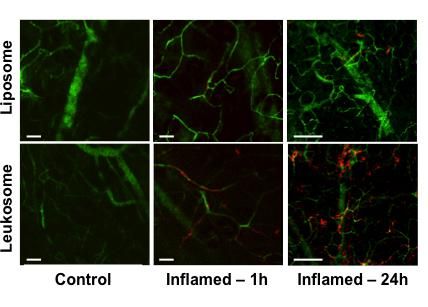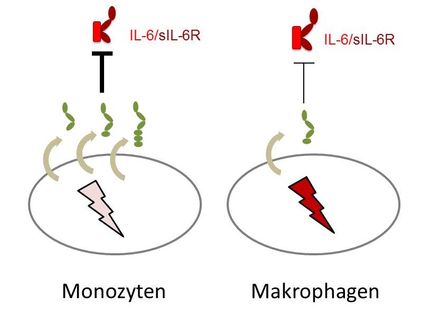Nanoscale Trojan horses treat inflammation
Advertisement
Nanosized Trojan horses created from a patient's own immune cells have successfully treated inflammation by overcoming the body's complex defense mechanisms, perhaps leading to broader applications for treating diseases characterized by inflammation, such as cancer and cardiovascular diseases.

IVM images of inflamed-vasculature targeting. Compared with control liposomes, leukosomes showed a five-fold and eight-fold increase in accumulation at one hour and 24 hours after particles' injection, respectively.
Houston Methodist
An international team, led by researchers at Houston Methodist Research Institute, described the creation of nanoparticles called leukosomes and evaluated their ability to treat localized inflammation.
Recent approaches to treating inflammatory diseases have been unsuccessful because an already overactive immune system treats simple nanoparticles as foreign invaders and clears them from the body, preventing them from reaching their target.
"A better approach for building effective drug delivery platforms is to find inspiration for their design in the composition of the immune cells of our body," said Ennio Tasciotti, Ph.D., director of the Center for Biomimetic Medicine at Houston Methodist Research Institute and the paper's senior author. "Immune cells such as leukocytes freely circulate in blood vessels, recognize inflammation, and accumulate in inflamed tissues. They do so by using special receptors and ligands on their surface. We purified leukocytes from a patient, then integrated their special ligands and receptors into the leukosome surface. Using the body's own materials, we built a drug delivery system camouflaged as our own body's defense system--thus the Trojan horse."
In its normal form, acute inflammation is a necessary and beneficial part of the body's defense against infection. However, under certain conditions, inflammation can turn from a friend to a vicious foe, damaging or destroying healthy cells. This is the case for autoimmune disorders such as rheumatoid arthritis, lupus and inflammatory bowel disease, or in illnesses such as Alzheimer's, cancer, cardiovascular disease and Type 2 diabetes.
Leukosomes are able to target inflamed tissues because they retain the same surface properties of the immune cell membranes from which they are made. To evaluate leukosomes' effectiveness as drug carriers, Tasciotti and his colleagues created vesicles from mouse leukocytes and filled them with dexamethasone (DXM), an anti-inflammatory agent.
"We used 'personalized' DXM-loaded leukosomes to treat inflammation in mice," Tasciotti said. "After administering the leukosomes, we observed their attachment to the surface of blood vessels surrounding the inflamed tissue, and they selectively delivered DXM to the affected cells."
The treated mice showed definite signs of improvement, including resolution of the inflammation, a significant reduction in tissue thickness, and a reversal of the immune response that is commonly seen in inflammation.
The success of the team's initial leukosome trial is encouraging, Tasciotti said, and suggests that membranes purified from any other cell types could also be used as biomimetic nanocarriers to treat other diseases.
"By combining cell biology with nanotechnology, we can create valuable medical tools that work within, and not around, the laws of nature," he said.
Original publication
R. Molinaro, C. Corbo, J. O. Martinez, F. Taraballi, M. Evangelopoulos, S. Minardi, I. K. Yazdi, P. Zhao, E. De Rosa, M. B. Sherman, A. De Vita, N. E. Toledano Furman, X. Wang, A. Parodi & E. Tasciotti; "Biomimetic proteolipid vesicles for targeting inflamed tissues"; Nature Materials; 2016

























































